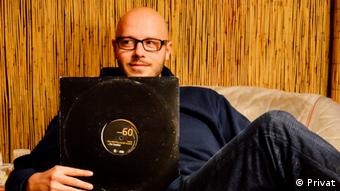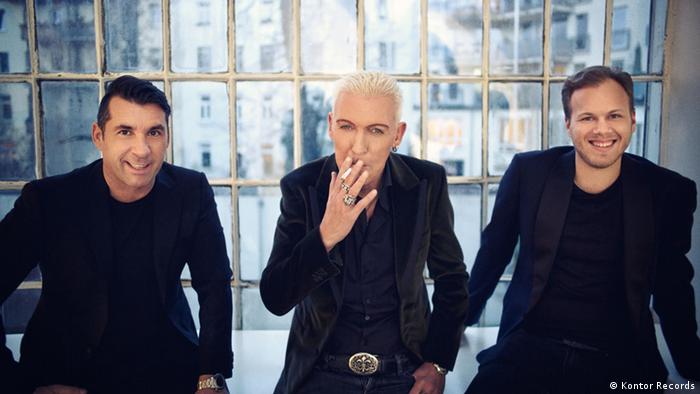Music
Techno in Germany: 25 years of the safe
Techno is often described as the “Sound of change”. A Club in Berlin became a cult meeting place for the scene: the vault. Today, electric is growing in popularity and the Club is celebrating its anniversary.
Watch the Video
02:51
Share
25 Years Of Techno Club Tresor
google+
Tumblr
VZ
Mr. Wong
del.icio.us
Webnews
Yigg
Newsvine
Digg
Permalink : http://dw.com/p/1JUqr
25 Years Of Techno Club Tresor
A dark, bare room, a few square meters, low Ceilings, and damp air. On the walls of the cellar vault of the old lockers, a Door divides the room with the thick steel-concrete walls and iron doors. The way down leads through a rustic staircase. Everything on the first impression uncomfortable.
This place on the Leipzig road in Berlin was a cult. At the beginning of the 1990s, he developed in a short period of time to the meeting point of the techno scene and became one of the most famous Clubs in the world: the vault.
The pure, cold concrete Aesthetics combined perfectly with the thumping futuristic Beats of the American Detroit Techno (one of the first Techno-game species), with the light flashing of the strobe and the fog, where the club-goers danced completely caught up.

The old Tresor Club in Berlin, at day (2013), deserted and empty
Originally, the cellar belonged to a Department store and was actually used as a Bank vault – hence the club name, and the remaining lockers. The Nazis confiscated the Jewish owner of the house, in the Second world war it was destroyed, on the part of the later Clubs, and fell into oblivion. Fortunately, Club-founder Dimitri Hegemann. He discovered the rooms in 1991 by chance and knew right away that this place was something Special. He sent for him mostly in the same condition as he found it.
Deck name: “gallery with Stand-up cafe”
Logged in under the of Clubs at the time often used Code name “gallery with a stand serving” threatened the safe with only short term to extended lease agreements – sometimes for only two to three months, often the. Until 2005, the Club held at the Berlin, Leipzig straße 126-128. After the sale of the premises Hegemann had to find a new place to Stay. From the original idea of the Club – and simply dig in, it was nothing.
Instead, an old power plant on Köpenicker Straße in 2007, the new home of the vault. With a Festival from the 21. up to the 24. July 2016 celebrated the Club’s 25th anniversary. Numerous well-known international musicians and DJs were invited to the Celebration of the club’s existence, DJ Juan Atkins from Detroit, a pioneer of the genre: For example, together with the well-known German electro artists Moritz von Oswald. The fact that a techno club as the vault could hold up to 25 years, while other Berlin Clubs like E-Werk or the Bunker as a result of gentrification, is not even understandable. This shows the importance of the “vault” and even Techno in Berlin.
Techno in Berlin

Jan-Michael Kühn holds a PhD in his PhD thesis on the Economics of Techno
That Techno in Germany and especially in Berlin met at the beginning of the 1990s, on fertile ground, was no coincidence. For techno expert, a sociologist and DJ Jan-Michael Kühn, the many empty houses after the reunification and the establishment of subcultural structures in East and West Berlin were declared even before the fall of the Berlin wall are important factors for the success of Techno, he’s in the DW-Interview. In addition, especially on recurring rhythms and physically noticeable bass-based music allowed for a sense of unity: “The music, the Dancing and the volume were the centre of attention. This is a kind of leveling and equality on the Dance floor came to be. Ultimately all were there to dance and have fun,” says Kühn.
But Techno is not necessarily in Germany, but was coined in the USA in cities like Chicago and Detroit DJs such as Juan Atkins or Jeff Mills. There are numerous different styles (House, Goa, Gabba, etc.), which are often created in specific places and very specific characteristics. For all that, Germany was a springboard, because “only in Berlin the principle of club culture is grown. That is, there are discos were rented, in which certain forms of music were played,” explains Kühn.
The precursors of Techno, the Bold General as “a Form of electronic dance music” is referred to, but are quite in Germany. Like the American John Cage, also experimented Stockhausen, the avant-garde composer Karlheinz in the 1950s with electronic sounds and techniques. In the 1970s, there were German Bands like Tangerine Dream and Kraftwerk, who did pioneering work for the electronic music, the Genre of electro-Pop-influenced decisively shaped, and numerous Bands of the 1980s such as Depeche Mode, David Bowie and New Order.

The Smiley face was the Symbol of the techno movement
Techno between Mainstream and Underground
Define to where the Techno starts and stops and how the Mainstream and the Underground to distinguish, considered Jan-Michael Kühn as very complex, because “the techno scene at the time, was not a homogeneous music scene of people who all wanted the same thing.” So it was artists like Dr. Motte, WestBam or DJ Marusha, who wanted to make the Techno for a large mass accessible. For the popularity of Techno in the 1990s, the successes of Bands such as Scooter or growing Events such as the Loveparade speak.
What you would call “Underground”, taking place rather in the Clubs, which stand for a particular style, and in those long mixes, not individual Songs. So Boldly concludes: “The right of the Mainstream has arrived in the Clubs, actually, never, because he can’t live there.” Many of the Clubs in Germany, such as, for example, the famous Berlin Berghain, remain in their culture of loyalty – also, if you are determined according to the Bold with a concept even more money could earn.

One of the most popular techno bands in Germany: Scooter
For Bold, leektronische music is in the last few years, becoming more and more popular. This is shown by the successes of artists such as Avicii, David Guetta, or even the popularity of the German Felix Jaehn and Robin Schulz. However, their music would be to listen to it more often to concerts instead of Clubs, so Boldly. But the electro-Boom of recent years has brought one major change: Where previously Singer-songwriters and Bands a significant contribution to the sound information have become an established DJs as an equal artist in the music business.
Jan-Michael Kühn (1980) is a PhD sociologist,
Blogger, as DJ Fresh Meat and recently published his PhD thesis as a
Book under the title “the economy of The Techno-scene”.